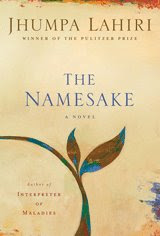Jumpa Lahiri has done it again. After her marvelous debut short story collection titled Interpreter Of Maldies, she has delivered The Namesake (now a Hollywood movie as well). If anyone had any doubt her talent after reading Interpreter Of Maladies, they would be surely removed once they finish The Namesake. The way she builds her characters early in the novel through short story type episodes and then weaves unexpected turns of events all through the novel is truly amazing and refreshing to read in today’s fiction writing.
Ashima and Ashoke Ganguli are immigrants to Boston from India when they give birth to their son. Their son ends up with the name of Gogul, just because his "good name" never arrives from his grandmother in India. Gogul hates his name and grows up as American as he can while his parents stick to their Bengali past. The unfortunate Gogol is tethered to this dual Indian-American life, never quite fitting anywhere. At first he shifts to Americanization, pushing aside the Indian rituals. But after a number of relationship failures and some few successes, Gogol is attracted to the comfort of his heritage. His perspective changes dramatically over the course of events, especially when he sets a bond with his father as well as the name given to him.
Jhumpa Lahiri has written a wonderful novel about immigrant lives, families, and bonds that can never be broken. Gogol’s story is actually a simple one, as lived by many Indians in America. This is surely one of the best ones in recent times.
Year in Review 2017
6 years ago
No comments:
Post a Comment